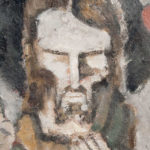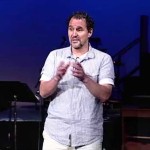We run our website the way we wished the whole internet worked: we provide high quality original content with no ads. We are funded solely by your direct support. Please consider supporting this project.

The Problem with Naming People’s Sin
Jesus told a woman caught in adultery: “Go and sin no more” (John 8:11). Since Jesus said this, does this give the church the right to tell people not to sin?
It’s one thing for Jesus, who “knew no sin” to say this and quite another for people like us—with tree trunks protruding out of our eyes—to say the same thing. The central point of the story where Jesus says these words is that none of her accusers were in a position to judge her. Jesus invited whoever was without sin to cast the first stone, but no one met that requirement. They were as much sinners as she.
Jesus, the only one who was qualified to condemn the woman, did not do so. Rather he told her to abstain from this sinful activity.
Here’s the lesson: if you want to judge someone else, you first have to be sinless. But if you are sinless, like Jesus, you won’t have any inclination to do so.
But what about the time that Jesus told the Samaritan woman that she had five husbands and was living with a man who was not her husband (John 4:16-18)? Doesn’t this mean that Jesus was setting a model for naming people’s sins?
Jesus didn’t mention this information to judge this woman. The only reason he let this woman know that he was aware of her past was to convince her that he was the Messiah. If this woman would “drink” the water he had to offer she would never thirst again. Even though he knew about her past, the offer of “life” was still on the table, no questions asked!
Had there been any shame or judgment involved, meeting a man who knew everything about her would hardly have been a joyful encounter. However, she went back to her town and joyfully proclaimed what she had heard.
Jesus did not try to fix people’s moral lives. He loved people and offered them everlasting life as they are, regardless of their moral lives. Whatever transforming impact God’s love has on people, it has incredible power because it is given before—and apart from—the transformation itself.
This is how we are called to love. We are to be the shadow that Jesus casts—to imitate God by “living in love, as Christ loved us and gave himself for us (Eph 5:2). We are to demonstrate the kingdom of Calvary-like acts of service and then proclaim the message of God’s kingdom.
We are to serve, no questions asked. We are to love before they are transformed—even our enemies—with a nonjudgmental love to all who are thirsty. To do this we must refrain from doing what Jesus never did: namely positioning ourselves as wiser, morally superior, or the “fixer” of others.
—Adapted from The Myth of a Christian Nation, pages 130-132
Related Reading

How do you explain the violent judgement of Ananias and Sapphira?
Question: You talk a lot about the violent depictions of God in the Old Testament. But what about God’s slaying of Ananias and Sapphira in the New? How do you explain that? Answer: The same way I explain divine violence in the Old Testament. There’s simply no reason to think the cruciform hermeneutic (reading Scripture…

The Danger of the Penal Substitution View of Atonement
About 25 years ago I was traveling on the freeway to somewhere or other and I stopped at a truck stop to get a bite to eat. I sat down at the counter next to this scruffy truck driver who had just started his lunch, and we started up a friendly conversation. Within about fifteen…

Where Psychology and Theology Meet
Guest post by Ty Gibson The biblical narrative reveals that God bears our guilt—not merely in the penal sense that Reformed theology asserts—but in the sense that He bears our misconceptions of His character as we project our sins upon Him. To the degree that fallen human beings find it psychologically impossible to bear the…

Is it okay to masturbate?
When I as a new struggling Christian raised this topic with my pastor, I was told in no uncertain terms that God struck Onan dead for masturbating. At some point I read the passage for myself (Gen. 38:1-10) and discovered my pastor had mislead me. It’s true that Onan was punished by God because he…

Podcast: What Do You Mean When You Say Jesus Entered Into Solidarity with Our Sin?
Greg talks about God’s passion for, unity with, and pursuit of his beloved bride. http://traffic.libsyn.com/askgregboyd/Episode_0330.mp3

Sermon Clip: Love: It’s All About the Cross
In this sermon clip, Greg Boyd talks about how Colossians 3:14 and the definition of love. God designed creation so that we would live in community with God and express God’s love towards each other and creation. However, sin disconnected us from God. In this sermon, Greg shows how we were created in the image…
